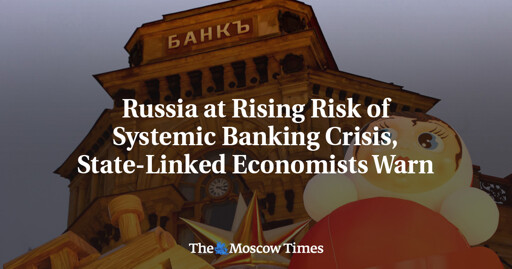The probability of a systemic banking crisis in Russia is on the rise, according to a new report from a state-affiliated economic think tank.
Experts at the Center for Macroeconomic Analysis and Short-Term Forecasting (CMASF) warn that while a full-blown crisis has not yet materialized, several warning signs point to a high likelihood of one happening.
In its latest analysis, CMASF describes the current situation as a “resonance” of negative economic signals: rising bad debts, early indications of depositor flight and mounting pressure on both businesses and consumers from high interest rates.
[…]
A systemic banking crisis, as defined by CMASF, would involve at least one of three conditions: non-performing loans exceeding 10% of total banking assets, a significant withdrawal of funds by depositors, or large-scale bank recapitalizations exceeding 2% of the country’s GDP.
None of those conditions have been met so far, but the underlying risks are steadily growing, the report says.
[…]
The Russian Central Bank, which has maintained a tight monetary policy to combat inflation, acknowledges that high interest rates are putting strain on the financial system.
Corporate borrowers are increasingly struggling to service their debt, while households are accumulating bad loans at a growing pace.
[…]
In a recent financial stability report, the Central Bank identified corporate credit risk and consumer over-indebtedness as two of the six primary vulnerabilities in the financial system. It noted a marked increase in the cost of credit risk and a deterioration in repayment rates, particularly among retail borrowers.
[…]
Some of Russia’s largest corporations are already feeling the pressure. The Central Bank reports that 13 of the country’s 78 largest firms now earn less in profits than they owe in interest — an unsustainable dynamic if high rates persist.
[…]
Russia has weathered banking crises before, most recently in 2014-2015, when a crash in oil prices and Western sanctions over the annexation of Crimea sparked a deep financial shock.
That episode was successfully predicted by CMASF’s early-warning indicators, similar to those now raising concern.
Oh no!
Anyway…
Of course, fascism does not solve the contradictions of capitalism and so does not make Russia’s economy any less screwed.
It’s not about any contradictions, it’s about people on top of Russia’s central bank and other banks being too competent. The banking system is, well, part of any war effort. When it survived what it shouldn’t have, seemingly easily, people in Russia’s government apparently decided it can survive everything.
The description from the article looks like an almost perfect banking system that tries to hold together an economy under unaffordable pressure.
It’s funny, of course, how Russia’s banking system, of all things, was probably better built than those of many western nations. But it has its limits.
A bit like a siege nearing an end.
The invasion of Ukraine might have constituted/might constitute a very large mal-investment of Russian capital with possible significant effects on the Russian banking system—it’s just a thought.
There’s no capital in decisions. Just the mafia.
Russia’s problems are not as new as they might seem, the roots are in the 70s.
“Capital” would be Ukraine, there indeed the local branch of mafia decided the capital is higher in the hierarchy. And it would seem a small difference, but a very important one, making Ukraine much better as a society.


